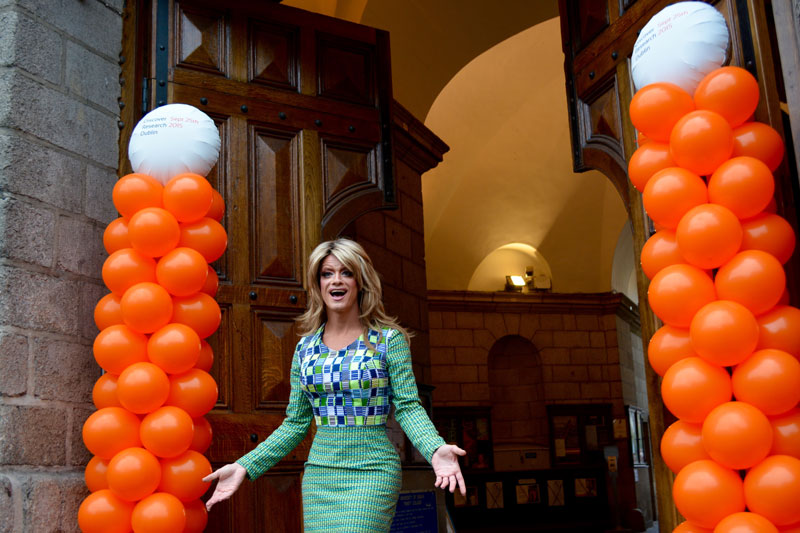Rory O’Neill, also known as Panti Bliss, is becoming a ubiquitous figure not just in Ireland but now more specifically in Trinity. Less than two weeks after receiving his honorary doctorate from the university, he returned to receive his honorary patronage of DU Players.
Despite the surprising lack of publicity surrounding the event, which is a key feature of Players’ first Queer Theatre Week, O’Neill was interviewed in front of a full house in the Players theatre. He was immediately relaxed and self-effacing but perhaps expectedly, his charisma permeated through the room instantly.
The first item on the agenda so to speak was his “face painting” routine. He described the process as a well-worn two-hour routine, but one that still remains very meditative and creative, the extent of which is often underestimated by those unfamiliar with the process. O’Neill talked of Panti as an extension of himself rather than merely a character he plays. He stressed the different strands of drag performance ranging from his own style to RuPaul’s Drag Race to Mrs Brown’s Boys. “If I didn’t have Panti I’d probably be a real flaming homosexual”, he joked, saying that she allowed him to express the perhaps more flamboyant but vital part of his personality.
O’Neill of course entered the public sphere in a massive way in the lead up to the referendum last summer. He spoke of his performances as a “very visceral way to put forward ideas,” talking of performance as a less intellectual and more emotional way to reach people. O’Neill himself is clearly a highly intelligent man, speaking eloquently and humorously on a variety of issues pertaining to Irish society post-marriage equality. While thrilled the referendum passed, he spoke openly about his worries that it has the potential to bring new restrictions and conservative expectations to members of the LGBT community. O’Neill referenced drag culture as an example of something that began for him as a kind of “punk” culture that has become increasingly normalised.
The conversation turned to the concept of “labels” as it were. O’Neill tactfully acknowledged how useful labels are as terms of explanation especially in an academic setting or as part of a large conversation. That said, he stressed the confusion that comes with the sheer amount of labels available to us. A group of people under one label will undoubtedly all be unique individuals in their own right. As such he feels it’s important to recognise labels within the LGBT community but not to become too “hung up” on them.
O’Neill of course received an abundance of laughs but tears welled up in the eyes of the audience during the question-and-answer session at the end. A student became emotional while thanking O’Neill for his work in the marriage equality referendum in particular. O’Neill, humble as ever, thanked the student for their sentiment but insisted there were thousands more who did just as much if not more work than him. O’Neill spoke with a captivating ease at a relaxed but none the less important event that once again marks the massive cultural contribution he has made to modern Irish society.







